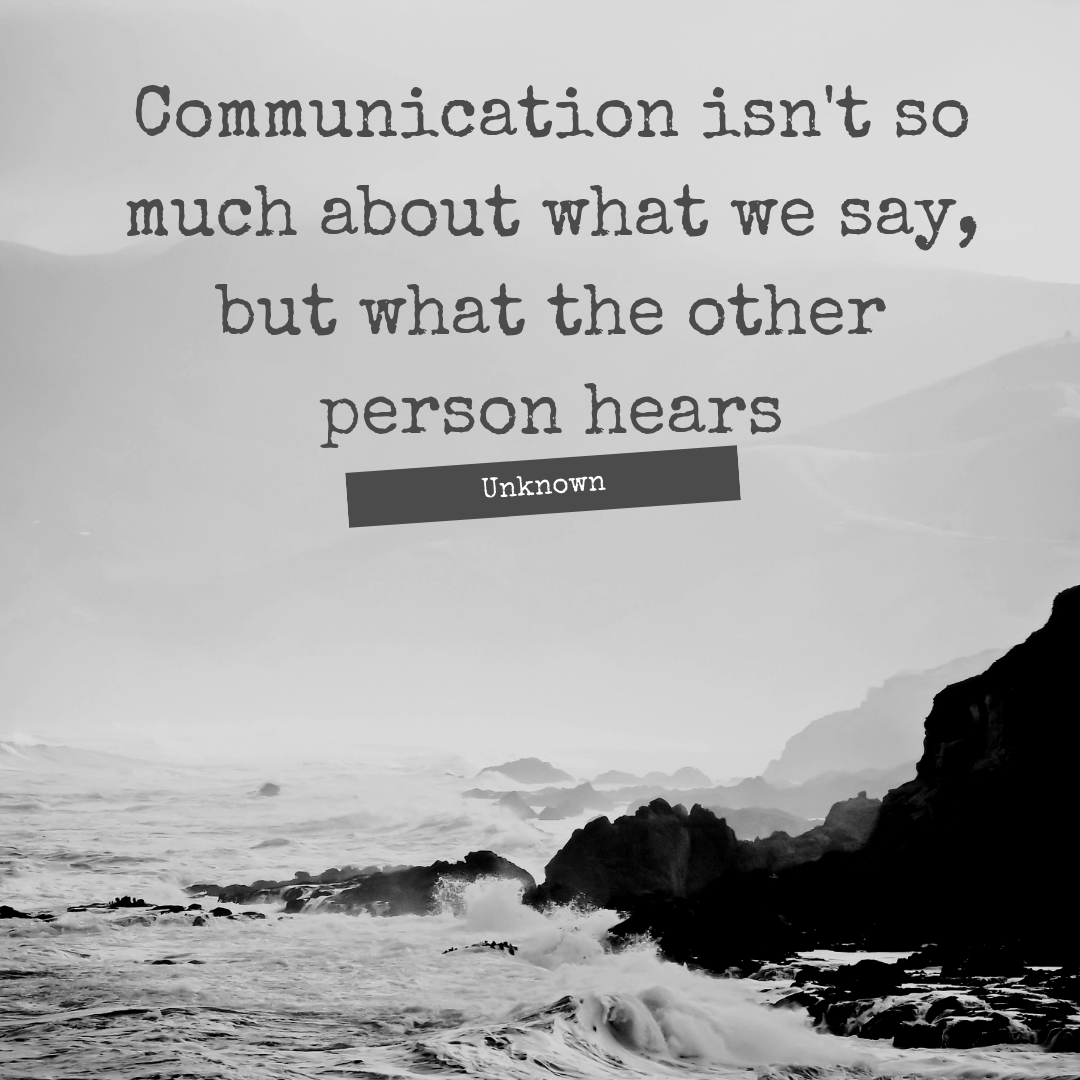“Communication isn’t so much about what we say, but about what the other person hears” – Unknown
I love this quote.
It sums up so many of life’s problems for me.
I actually find myself butting up against it quite regularly in my life—with my partner, or with my patients who interpret something I said in not quite the way I intended it.
In every little interaction in the world—from a clipped response from a coworker to a seemingly indifferent or aloof barista—we need to ask the questions: What do I make it mean? How am I taking it? And conversely, how is someone else taking my words? Tone? Energy?
What do we really know of another and their intentions unless, when we are hit by the wall of assumptions and irritations, we ask: I wonder what they meant by that? I wonder what caused them to respond like that? Did the barista just receive bad news? Are they stressed about a sick parent? Is my coworker worried about the fight they just had or a deadline looming?
“What did you mean by that?” It’s a simple question that can shift the landscape of our life.
I’ve generally found, in my life and through listening to the inner assumptions of others, that we tend to a) assume the worst and, b) see things through our lens only. These are, of course, tainted by our life experiences, wounds, and moral code or belief system. Which is unique for every single person out there.
We tend to assume the worst and make up stories that fit our narrative about how the world works, how people should act. In many ways, it helps us get through the day. It helps us compartmentalize and categorize. But in the long run, and particularly with the polarization of our world politics, extremism, short tempers, and all the hate talk out there, it’s actually hurting us more than we can imagine.
A bit crazy when you think about it—that we assume. For how in world could we possibly know what motivates another? What hardship or tragedy has befallen someone? What shoes have they been walking in in their life? Because, believe me, every person out there has had something that has taken them to their knees or cracked them open in a way that would bring tears to our eyes or a fierceness to our heart if we were to listen.
To be human is to be flawed. To be human is to be wounded. Through childhood, peers, ignorance, or abuse, we get hurt. Ultimately, if we can find our strength, our resilience through this and shape it into wisdom and experience that we can then offer up to the world in our unique voice, that’s ideal.
But sadly, in the process, we mess up. We say things wrong. We step on toes, inflict unintentional blow to others. Or we assume through our lens and get the emotional wind knocked out of us. We suffer. We suffer because we don’t understand. We don’t have the tools, information, words, or skills to understand.
We get stuck in these ways of understanding the world or believing how things “should” be and project these on others. We use words that mean different things to different people.
Just the other day, I came up against this with my partner. I used a word that was harmless to me, but he had a story attached to it. It was a different story than mine. We had to wade through the muck ofassumptions and irritations and push back until we got to the root of what was going on. We were saying two different things.
This is hard work, this seeking to understand rather than assume. Assuming is so easy, so convenient. It’s quick. It nicely fits into the box of our worldview. It doesn’t require a lot of work (short-term).
But I invite you to look deeper: How much does assuming really cost? The fight with your kids, your boss, your best friend, your partner—so often, it’s the people we’re closest to that get the backlash of our assumptions. And they are the ones who are hit the deepest.
But what about the guy behind you in traffic who’s itching to get by—is he an asshole or actually rushing to the hospital to see his father who just had a heart attack? What about the salesclerk who’s just a bit too aloof and uninterested in friendly customer service? Are they simply an apathetic millennial that we can casually brush off, or maybe they suffer from anxiety so severely they are barely getting by? Who knows? I sure don’t.
Yes, sometimes people do irritating and asinine things. And no, I’m not saying we turn a blind eye and let things slide when we shouldn’t. But I am suggesting that, perhaps, when we come up against something thattriggers us (that flash of irritation, anger, or hurt that seems to hijack a perfectly innocent moment), we try to take a breath. And, in that brief yet powerful pause, we ask, “I wonder what’s going on that made them say that?” or, if appropriate, “Can you tell me more? I’m not exactly sure what you mean by that.”
Some of the best but hardest work I have ever attempted is assumption-free communication. This challenges us to fully own our feelings, our reactions, and our life stories. When we stop putting our life on someone else, and instead own what we feel, what we think, and what we need, there is a completely new world that opens up to us. And, in my experience, it’s one with a lot more space, freedom, and empowerment in it.
We’re no longer at the mercy of taking someone else’s actions personally. It’s no longer done to us, but we can recognize that everyone out there has their own story.
When we approach things from a place of “I wonder” instead of assumption, the world might just have a little more space for compassion, understanding, respect, and the humanness that affects us all.
As seen on the Elephant Journal by Angela Warburton

